This page was last modified: May 8, 2025
Recent Changes:
1.1 Each Kindren Campus is now officially called a "Mission Campus".
The Kindren Tree's mission is to develop our collective potential towards an all-inclusive prosperity that leaves no one behind. We do this through a community enterprise network driven by perpetual learning, resource sharing and productive collaborations.
Our motivating desire is to eliminate the following 10 key "Troubles" in society: Poverty, Dangerous Fanaticism, Violence, Social Apathy, Prejudice, Corruption, Pollution, Depravity, Oppression and Preventable Diseases.

This page is the Root Mission, which is a documentation of Order that covers the system of relationships, rules, regulations and procedures for the entire Kindren Tree network. The Trunk, Crown and Branch Missions are subordinate constitutions that may be created for the regional, local and group subdivisions of the network.
For all policy conflicts, the Root always overrides any derived Mission extensions.
Our expansive social mission is organized around the following 3 main segments:
The following list describes the social infrastructure for members of the Kindren Tree network.
The following list describes the Campus divisional layout of the Kindren Tree network.
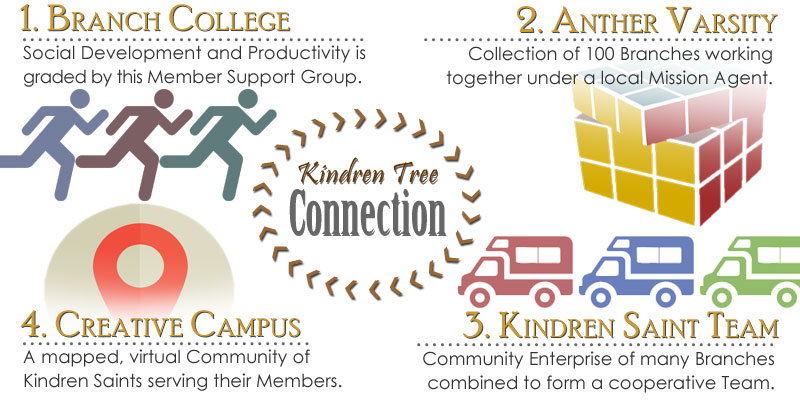
Each community of affiliated Mission representatives and their Branch Colleges are grouped into Sanctuary Teams called Kindren Saints. These Teams can have multiple administrative categories but each Saint is assigned just one single Spot Number between #00 and #99 to uniquely identify it in a Campus. The roles and responsibilities of each category are outlined in the section below.
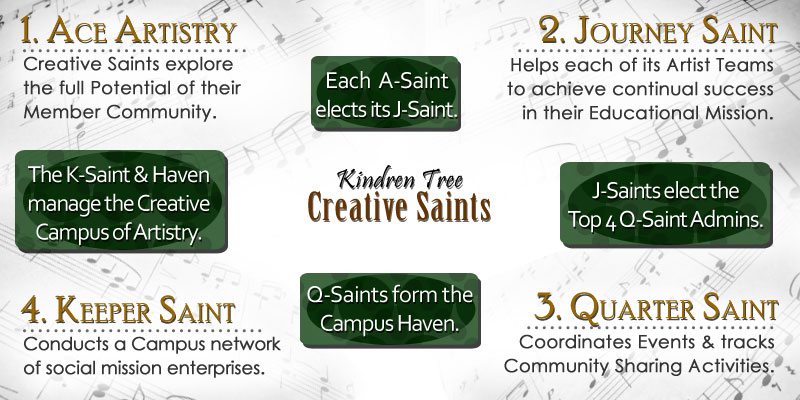
The administrative staff of each Kindren Tree subdivision is known as its Council of Squires (or "Squared Circles"). The square represents the 4 Keys to Mission success: "Structure", "Economy", "Development" and "Unity". These administrative councils are charged with the difficult task of bringing order to all the various circles of mission activity.
Five key roles address the duties of a council group. They consist of a Goal Keeper role at the center along with the President, Vice President, Secretary and Treasurer roles supporting the Keeper. There can only be a single Keeper per division but the other roles can be served by multiple individuals.
The Council of a Haven is the most prominent administrative staff as it oversees an entire Campus of Saints. An administrative council's positional roles and powers are listed below:
A Haven Council mediates conflict between Teams and their Branches by holding "QuiBall" Conflict Resolution Courts.
Havens may also request updates to the general rules for their Campus known as the Trunk Mission. The Haven's Principal should be the same person serving as the Campus Superintendent (K-Saint's Keeper).
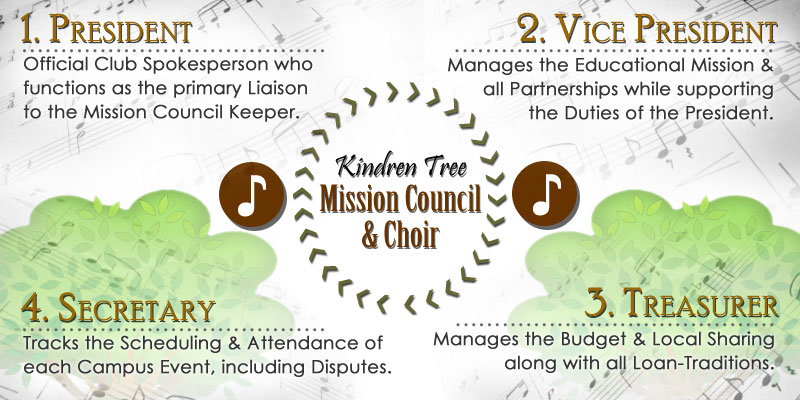
Basic Membership begins when an applicant enrolls as a Kindren Tree Community Member (C-level) by following the instructions listed on a Branch's official Mission page. Enrolled Members can then join Events, earn a variety of community points and participate in Team activities as a contributing sponsor of the Saint enterprise.
A Branch admin must first share their enrollment form's link and passcode with the applicant to begin the registration process. This key is then used by the applicant to complete the online submission form.
There can be up to 100 Anther Varsities in a Full Saint Team along with a maximum of 100 Branches for each Varsity. Each application is first processed by the Campus Superintendent before being passed on to the chosen Principal for final approval.
Only after first registering as a Branch College Member can someone then eventually gain promotion to become a Branch College Dean (B-Level), which manages the group by coordinating activities and goal-tracking.
From that B-level, one can then graduate to becoming an Anther Varsity administrator (A-level) by filling out the related online application form for a vacant Anther Branch spot. This A-level promotion will start as an Anther Branch for the new Varsity with the Dean of that Branch acting as the Varsity Captain.
A registered Anther Varsity Captain can also proceed to establish their own Saint Team with the permission of the Campus Superintendent.
This entire promotion process is conducted by the Mission Keepers at each respective level (Campus, Team and Branch) according to their Mission's promotion procedures. However, Privileges and Permissions are granted at the Campus Superintendent's discretion.
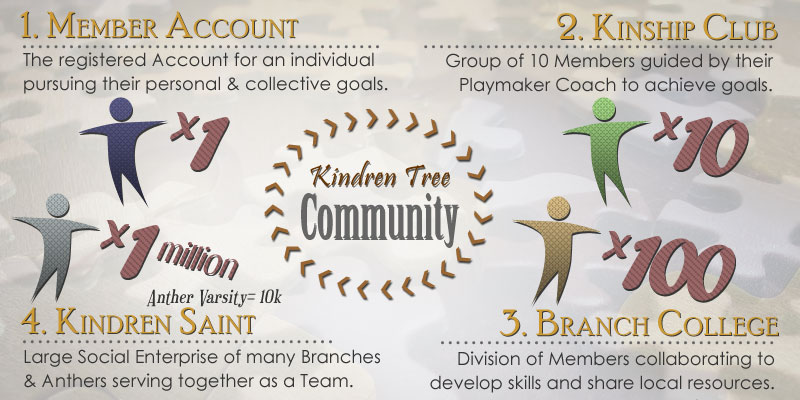
A new Saint Enterprise is initiated by the Campus Superintendent when they allow an active Anther Varsity Captain to assume the role of Principal for a vacant Saint spot number.
A Team in good standing can then be registered as a J-Saint or Q-Saint by changing their ranking classification through the Task Request System (TRS).
New K-Saints are registered by the addition of a new Campus to the network. They are sponsored into office by a unanimous vote by all active Campus Superintendents so additions occur only when they deem it necessary to grow the network.
Each New K-Saint account is required to begin their tenure with at least 999 bP and at least 100 Task points.
topAll Campus Q-Saints make up the Haven but its Administrative Council tier is elected by the J-Saints located within the associated Campus. Elections are held once every quarter (3 months) for choosing the administrative Saints that will govern over the next quarter.
Only active J-Saints are eligible to vote in these elections, which occur by the voting Team choosing its favored Campus Q-Saint. The weight of a J-Saint's vote is equal to the number of Saints they represent, thus a maximum of 10 votes.
The top 4 Q-Saints with the most votes are elected to the next administrative rotation of Council leadership. They choose their roles based on Integrity-Point seniority so the highest iP-ranked Saint will get first choice of their Council position. If two Teams are tied in Points, then the one with the lowest Spot number gets the benefit of seniority preference.
topAn active Saint can evolve into a Kinship collective of one Host Team with up to 9 sub-Teams from their Campus. Teams in a Kinship may be held liable for the Conflicts of related Saints but they can also share certain incentives as a benefit.
Teams can use the Task Request System (TRS) to join a Kinship if there is a vacant spot available. The Host Team may dismiss sub-Teams from its own Kinship using the same system.
The term "Kincentive" refers to the collection of social benefit points and game data designed to encourage Kindren Teams to invest in their community. This data is NOT to be treated as personal property or to have monetary value but rather to be used as a measure of effective participation in the system.
Community Points are often abbreviated as 2-characters with the first letter in lowercase and the 2nd letter in uppercase. This format distinguishes them from project roles, which would have double uppercase abbreviations. The following section describes the various Kincentive data.
topThere are 4 main categories of Kincentive data for Teams: Bread Points, Unity Time Hours, Integrity Points and Task Points. The circulation process begins when resources from outside the network are contributed to sustain the Kindren Mission.
Each financial contribution is recorded as a Sponsor Payment made to support a specific Branch on a Team. This given amount is then converted into an equal number of Bread Points (bP) to be acquired by the Team related to that Branch.
For example, if a sponsor contributes $25, then its chosen Branch's Team would receive 25 bP to use in the network. Even though all Bread Points are essentially shared within the Campus, each Team determines how it will use its own share of points.
Bread Points Max Limit: 99,999 bP
Unity Time Hours (hR) are Time-based points designed to inspire skilled resource sharing within the network. Each Hour represents a single Team's task hour.
Unity Hours Max Limit: 9,999 hR
Integrity Goal Points (iP) is the overall rating that establishes the ranking status of each Team in the network. Each Saint's iP should be continually increased through community activities in the system unless downgraded through Conflict penalties. Teams can earn Integrity Upgrades each time they achieve a significant feat in the community.
Integrity Goal Points Max Limit: 9,999 iP
Each Integrity Upgrade requires a sacrifice of 10 hR.
The following list shows the various ways in which Teams can raise their iP.
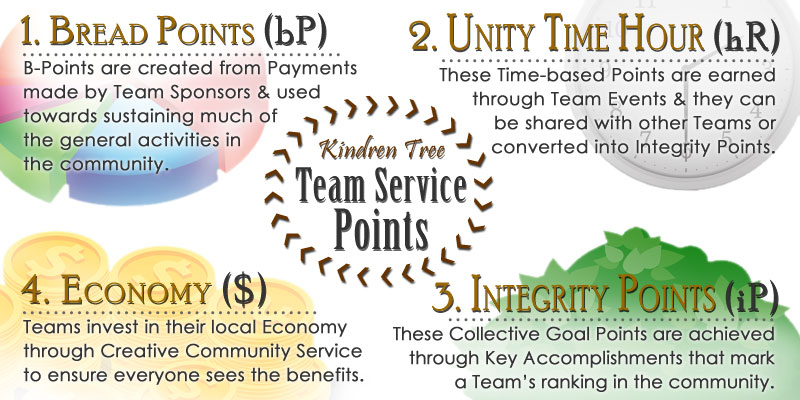
Account updates and most other Team transactions are processed as Tasks by the K-Saint. Each Team's Task Points (tP) measure the limits of its ability to conduct these requested Tasks. In other words, it functions as the fuel needed for a social enterprise to function properly.
Tasks are processed through the Task Request System (TRS), an online submission interface used by admins. The following list describes the various ways a Team can earn Task Points.
Task Points Max Limit: 9,999 tP
The Kindren Current is the systematic task flow of value from exclusive assets into shared quality Time and ultimately towards a healthy blossoming of human potential.
This is reflected in the process by which sponsor contributions are converted into Bread Points before transitioning into Unity Time and then finally into Integrity Goals.
The Current should continually flow in this direction so as to balance the faults of external systems while ensuring that maximum benefits can be efficiently gained with minimal resource expenses.
topThe Principal Keeper of a Saint Team can reward its Branch Colleges with Voting Points (vP) for their participation in activities supporting the Saint's Mission. Voting Points (or "Votes") are also gained by matching the paid contributions of Sponsors who purchase Bread Points for the Saint.
These Votes act as a measuring tool for the mission service of Member Branches. Voting Points can be deducted when help is received and then raised again when support is served to others.
Voting Points Max Limit: 99,999 vP
Each non-zero Member Branch (#01 to #99) is expected to Pledge a certain amount of Votes each week to give to its Anther Varsity conducting Team activities. This Pledge should amount to 10 Votes per individual Member account in the Branch College.
Thus, a 50-Member Branch would give 500 Votes each week to their Varsity's Anther Branch. The transfer of Votes only happens once per week and should likely be on the "Pledge Day" that the Branch had chosen at enrollment.
Pledge transfers can only occur once in a 7-day span.
A Branch's current Voting Points can be allowed to drop into negative numbers at the discretion of their Team's Principal. When needed, the administrative staff should manage an ideal balance between positive vP ("Overscores"/∩) and negative vP ("Underscores"/∪) on their roster.
Voting Points can be gained by the following methods:
Member Branches maintain their productivity through a system of weekly goal tracking for their Team. Each Branch is graded on their goal production, thereby affecting the number of Running Score Points (rP) earned from these goal achievements.
When a Branch's Running Score reaches 100 rP, the value resets to Zero and the Member Branch wins a set number of Goal Points (gP). The amount of gP gained depends on the total number of Pledged Votes given to their Varsity's Anther Branch.
One gP is earned for every 10 Votes pledged.
Each Pledge transfer is also converted into +gP for the Anther Branch. This conversion helps sustain the Anther's registration fees for hosting Mission Events that allow the Pledging Branch to meet their own Goal obligations.
Branches attend special Events in order to use their Goal Points while gaining access to shared resources and projects.
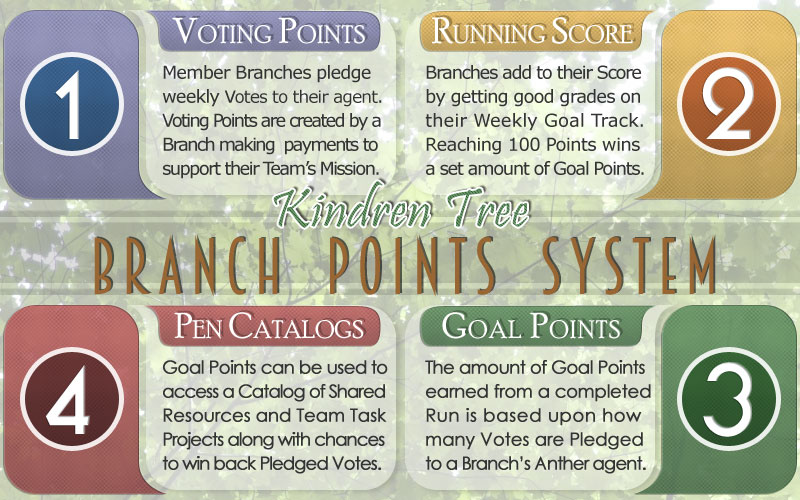
The penalty for a Branch failing to have enough Votes to meet its weekly Pledge is -100 rP.
Any Branch with a negative gP score may be removed from the network.
topK-Q-J is a classification system for the collaborative Events bringing Saints together. Each Team plays their role in a collective mission to fight common social problems through innovative goal tracking.
Saints host these Events through their roster of Anther Branches. Each Event is classified by one of the 3 following categories:
The K-class Event is used for hosting Conflict Resolution courts.
The Q-class Event is a general category for connecting Saints and their Branches through resource sharing projects and activities.
The J-class Event refers to the educational "journey" of sharing and developing knowledge within the community. These J-workshops allow Branches to gain Aptitude Points from organizing skill development events.
Each key activity is marked by the Campus Superintendent as an official Kindren Task. When a Team is the receiving party of a shared Task, it's described as getting the Stock of that Task. The stocking Team can reward the sharing party with Kincentive points as a way to encourage collective sharing in the community.
In order to Stock from the network, A Saint must have an active account in good standing. Each conducted Task occurs at the permission of the Superintendent processing it and can be denied at their discretion.
In these community transactions, the sharing party is referred to as the Sharer while the receiving party is known as the Stocker. In regards to shared items, the Sharer and any related Members agree to contribute these resources to their community through this team-oriented process.
All parties agree to handle any disagreements through the K-class Dispute system, which functions as the official Kindren Tree Conflict Resolution process. Every Member of the Sharer and Stocker parties agree to abide by the Haven's judgment on any resolution.
All parties also agree to accept any possible liabilities in the form of a deduction to their Integrity points and/or other points as claimed in the Conflict Resolution.
The Community relations of the disputing parties (such as Kinship Saint relations and J-Saints) also accept these same liabilities if their related party cannot sustain the full burden of the resolution.
top"Library Pen" is the term for the recorded history and current listings of Member projects and Campus events used for sharing community resources. Each Branch manages their own collection of these records through their social media accounts as part of an openly transparent incentive system designed around achieving mission goals.
A Member Branch uses its earned Goal Points (gP) to attend the community events where shared resources are made available from other Branches.
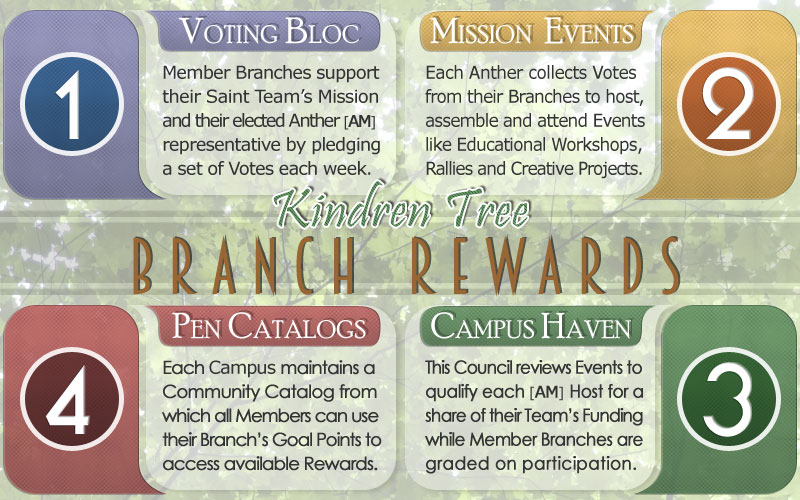
Community transactions are processed as Tasks by the K-Saint. For example, processing 3 Milestones and then sending Bread Points out to two different Teams would result in a total of 5 separate Tasks.
Each Task usually reduces the Task Points of the initiating Team but there are some exceptions. The following list shows the Task Point cost of various transactions:
In order to sustain the Kindren mission, external funds are acquired through several forms of support. General patron support can come through 3rd party applications but these payments do not influence the internal incentive system.
Alternatively, Sponsored Payments come from Members or non-Members pledging funds to support a specific Branch and can then generate a variety of new points in the system.
Each pledged dollar that is paid to sponsor a Saint will in turn generate an equal number of Bread Points (bP) for that Team. Voting Points are also created for the selected Branch within that Saint roster. Teams can then use their current Bread Points to trade for Task Points from their Campus K-Saint.
Anyone can make sponsored payments in support of a Team's Branches, thus allowing the creation of points needed to sustain the system of mission activities. As the social enterprise evolves then the investment pays off for local partners through the development of a skilled, resourceful and motivated pool of community associates.
Points circulate throughout a Campus by way of Task activities, thus creating incentives and methods for people to invest in the Community's social enterprises. The following list describes how the revenue and task points are interconnected:
Sometimes a Team may be short on Points or Hours to participate in Campus activities. Traditions occur when a Team borrows points from another Team with a promise to return the full amount in smaller pre-set quantities at regular weekly intervals.
There is no interest charged with these Traditions but there is a penalty (-1 hR) added to the debt each time there is a late return. Failure to return the full amount may result in a Conflict followed by an Integrity downgrade.
To lower the risk of conflicts emerging, Traditions are limited to Kinship-related Saints, Havens and K-Saints.
Team Kincentives (like bP, hR and iP) have no value outside the Kindren Tree Community and cannot be cashed out.
topA Haven functions as an active Team account but it can only acquire points through certain activities and powers. Processing and Registration fees are some of the income methods mentioned earlier.
Unity Hours collected by the Haven are to be used only for loaned Traditions. As the Haven replenishes its resources, the Council Members can unanimously elect to make a Haven Tradition loan to any struggling Team in their Campus.
The Haven Council should regularly provide this support to struggling Teams in their Campus community. By playing out 10 Cap Points (10 cP), Teams can then donate 10 Unity Hours (10 hR) to their Haven to sustain this charity service.
In return, the donating Saint receives a digital token of their generosity called a "Tribute Incentive Point", or simply named a TIP. Each Team keeps a collection of these Tips in a digital log called the Tip Jar.
A Team can win an Integrity Upgrade (+1 iP) from 10 Tips if it has the applicable Game cards to perform the conversion. Also, inside the Tip Jar is a collection of Kincentives called Cap Points (cP)
These Cap points (or "Caps") are earned by resolving Conflicts within the Campus Community or through specific Card Game Plays. Caps are played out in order to create Tips from Haven donations.
The penalty for failing a Milestone deadline is a loss of all Tips & Caps in a Team's Tip Jar.
topKincentive Points have no value outside of the Kindren Community and cannot be cashed out for money. However, Team admins working from within the Campus K-Saint can "elect" how their "Slice" from the Campus Bakery funds are spent to sustain the network.
The "Bakery" refers to the total pool of available funds invested into the Community by its Sponsors.
Slice Points (xP) are the measure of each Anther Varsity's voting share of these funds. They are assigned based on Task-driven activities that sacrifice Bread Points. These Sliced funds should be directed towards maintaining the Kindren Tree Mission while serving the goal-oriented production of its Members.
The Superintendent earns their own monthly share directly from the Task Expense Allowance that is derived from the exchange of Task Points for Bread Points.
In general, certain admins can earn their own Slice depending on the methods listed below.
Principal then distribute this Bakery allowance to their Varsities based on each Anther's weekly collection of Slice Points (xP). This value is a product of a Varsity's (Q/J) Event productivity and the Team's Slice Rate (xR), which is established by the Principal Keeper.
In turn, Anther Varsities use their share of the funds to provide resource sharing events to their Member Branches. This cycle of resource sharing encourages the continual development of Member potential.
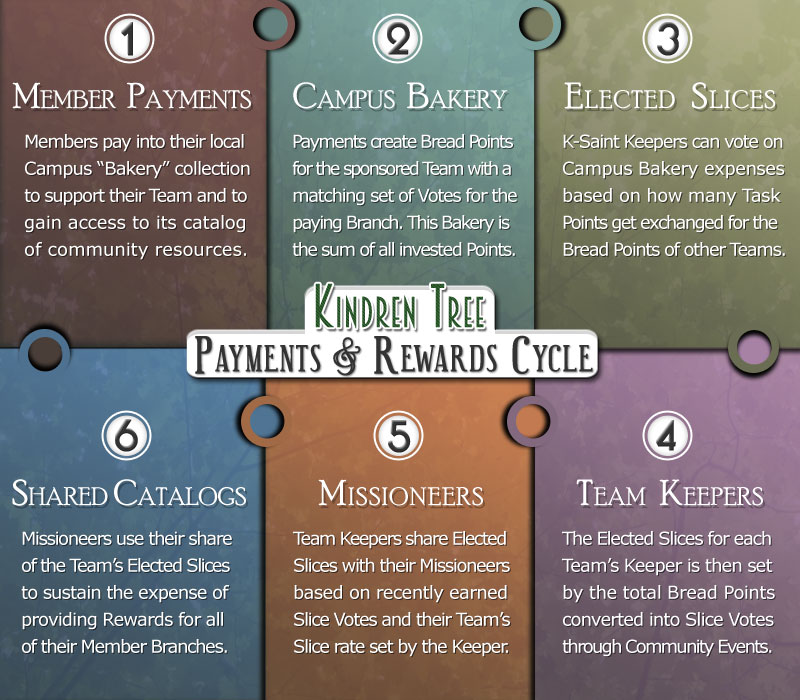
One of the primary goals of the Kindren Tree network is to solve chronic problems facing the general society. Therefore, Mission Rally Events are designed to mobilize Teams against these issues while also offering a variety of incentives to invest in our full potential.
The Kindren Mission revolves around the collective effort of Teams to serve their community through socially productive collaborations. Members attending these special Rally Events can share their talents and resources with others while gaining Kincentive benefits.
A Saint Team can register and host a Mission Event with their Haven's permission. Once registered, other Teams can then join this Event after getting invited by the hosting Saint. The joining Teams essentially agree to send one or more of their own Member Branches to participate in that Event.
Each participating Team agrees to serve as an official Event Patron by sacrificing 1 tP (Task Point) for each attending Branch.
The specific incentive for Event Patrons is called the Patron Reward and this functions as a return on the investment made through their coordinated support. Each Patron Saint can earn a set number of Hour Points (+hR) based on the total number of attending Saints for that Event.
The Host's Leaf Mission is a preset list of local Event rules and these apply to any Event that they are managing. All Patron Teams and their Members accept these rules when they sign up for an Event.
Common expectations of courtesy should apply as well. All guests are responsible for their own safety and precautions so they should exercise reasonable judgment when doing Event activities.
Each Rally Event is categorized by the KQJ system mentioned earlier in the Event Economy section. K-class Events are for Conflict Resolution Courts. Q-class Events cover resource sharing while J-class Events feature educational workshops.
An Anther Branch uses up a single point (-1 gP) from its collection of Goal Points to either register as a host or gain admission to a Rally Event.
A Kindren Milestone is a scored record of a Team's participation in Campus Events. Teams perpetually work to complete each of the four Milestone categories by gaining Milestone Point (mP) bonuses as these categories also relate to the type of Event being conducted.
The 4 Milestone classifications and their relationship to the KQJ Events are shown in the following list:
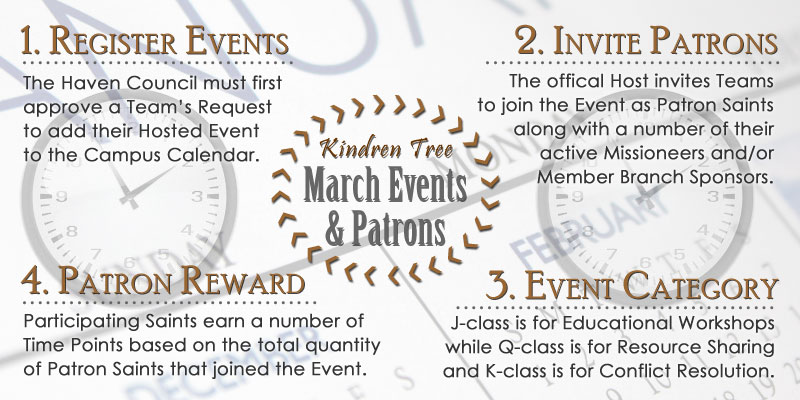
Patron Saints gain a preset number of Hour Points (+hR) based on the total number of represented Patrons attending the Event. Guest Saints of Q-class Events agree to share their gained Hours with the Host Saint in exchange for its resource sharing.
Teams can also earn a bonus Hour Point reward (+1 hR) for an actively charged Legacy Game play. The following list shows the hR points earned in relation to the total number of Event Patron Saints.
Event Patron registration is NOT allowed on the Event's Processing Day as this is the day when the Haven Secretary processes the final transactions and closes the Event. This END date is exactly one week from the Event's registration date (except for Quib court events which have a 3-week duration).
If enough qualified Patron Branches attend a J-class Educational Workshop, then the Host Branch ("Lesson Keeper") can gain an Aptitude Point (+1 aP) in that Lesson's related field.
If their attendance leads to the Host gaining an Aptitude Upgrade then each attending Branch accepts the sacrifice of one Spell Aptitude Point (-1 aP) related to the J-class Event's subject field.
The Host Team of a J-class Event also sacrifices a number of its Bread Points to allow for each successful Spell Upgrade while rewarding the hosting Anther Branch with a gain of Slice Points (-bP = +xP).
This resulting xP reward is based on the Host Anther's current Aptitude Level (aL), the Team's current Slice Rate (xR) and the related qualifications of the other participants in the workshop.
The following list shows the four STEP Aptitude Levels and the attendant prerequisites for the Host Branch to gain an Aptitude upgrade (+aP).
Patron Branches at a J-class Event must have at least 10 aP in the related field in order to be qualified to support the Host Branch's Aptitude Upgrade beyond Student Level.
Aptitude Upgrades for the Host Branch cannot exceed their Team's current aP amount by more than 10 points in the related field.
Each local Ground has a Champion Saint to celebrate their notable efforts at resolving disputes in the region. This recorded title can be updated when a Team pitches a completed Conflict Resolution for the Branches in that Ground.
The specific KQJ-class of an Event and its measured participation variables determine the progress a Team earns towards achieving a Milestone completion Goal.
The following lists show the Milestone categories along with other data like Goal Points (gP), Votes (vP), Slices (xP) related to Team Slice Rate (xR), Spell Aptitude Points (aP), Bread Points (bP) and Milestone Points (mP) affected for each Event class:
top
Rally Events function as the focal point for community activity and therefore sustain the progress of the overall Kindren mission. The collective movement taken by Members to complete their mission Events is referred to as the "Marching Saint".
A Branch Kettle is a Campus Sandbox station that serves as a local base of operations for a Branch College. The following list explains the various types of "Mission Marching" featured at Events. The numbers 0-9 relate to the Ten Troubles that the Kindren social movement is dedicated to solving.
Grassroots Education involves the collaborative use of workshops to learn, practice and teach various skills in the network. Some workshops may have restrictions based on local laws or conditions.
The Skill level of a Branch College is tracked by Spell Aptitude Points (aP) ranging from 1 to 360 for each listed Skill category. Branches can gain a single Aptitude point by hosting and coordinating a Mission Event where the related Spell ("Specialty Skill") is set as the featured subject.
A detailed overview of this skill tracking system can be found on the Grassroots Learning page. Each Branch should maintain a Portfolio blog to show evidence of its acquired experience.
There are 4 Spell Aptitude levels (aL). This STEP ranking system is based on the number of points collected for a particular Skill:
In order for a J-Event Hosting Anther to receive a Level 2-4 Spell Upgrade, each of the attending ranked Anthers must accept a Spell Downgrade in which they sacrifice Aptitude (-1 aP) in the Event's related skill field.
In order to keep Members focused on maintaining their skills, there is a perpetual reduction of aP for all inactive Branch accounts. This reduction is called Spell Decay and it reduces Aptitude Points at the rate of -3 aP per 7 days of inactivity or -25 aP for 30 days of inactivity. This helps prevent complacency after accumulating a high tally of Points.
topMembers as well as unregistered Individuals can file an official claim of Conflict against an active Team in regards to a disputed transaction or grievance within 3 months of the Conflict's date of occurrence.
The Kindren Tree mission takes a constructive, team-oriented approach to conflict resolution so the plaintiff party is called the "Pitcher" and the defendant party is the "Catcher".
The Haven Council plays the role of "Coach" in arbitrating an ideal settlement between the two parties. Any active Q-Saint in the Haven can vote to approve the suggested resolution given by the Pitcher, the Catcher or a 3rd option provided by the Haven Council (based on past Resolutions).
A commendable resolution can be referenced by the Council as a model for future cases and therefore establish it as a Classic Pitch-Catch or Patch Resolution. This system of conflict management is called the "QuiBall" game and the procedure is outlined on the Kindren Conflict Resolution page.
In a Conflict between related Saints, the following procedural changes apply:
J-Saint Conflicts: If a Team is in Conflict with its J-Saint, the subject can choose another active, consenting J-Saint to help it resolve the case during the process.
Haven Council Conflicts: If a Team is in Conflict with its Haven or with a Q-Saint on the current Haven Council's administrative tier, then the Team can request the Campus Superintendent to judge the Pitched resolution directly. The K-Saint judgment is final and there is no appeal option for this special process.
K-Saint Conflicts: If a Team is in Conflict with a Superintendent, the claim is filed with their Haven Council as a normal case but any appeal would go to the main Kindren Tree headquarters instead of the Campus K-Saint.
Non-Member Conflicts: Individuals that are unregistered and therefore outside the Kindren Tree network can file Conflict claims against an active Team for actions that affected the accusing party. The claim is filed with the Haven in the Campus jurisdiction of the accused Team and the Haven Council President is charged with both guiding and representing the non-Member through the process.
topIf the final decision favors the Pitcher's resolution then they're awarded the FULL Quib claim. The Disadvantaged Catcher's account must then be deducted iP based on the case's category and the following scale:
If the Disadvantaged Catcher does not have enough points in their account to sustain the full resolution deduction, then the remaining loss is shared by the following related parties in the given order until the total amount is covered:
In most cases, the sequential order of sharing a disadvantaged deduction is determined by the iP-Ranking (lowest-to-highest). If iP is tied, then the highest Campus Team Spot number is chosen as the tiebreaker.
During the Conflict Resolution procedure, the Pitcher and Catcher accounts cannot be modified in regards to related Kinships or J-Saints. In addition, any Branch that is deemed by its Saint Keeper Principal to have been responsible for the iP loss may be subject to a loss of -gP based on the Team's preset Quib Rate (qR).
For example, a qR value of 5 means that a culpable Branch would lose -5 gP per single iP lost by the Saint Team from a Quib result.
topIn the case of Conflict resolutions, either of the contesting parties may appeal the case resolution to the K-Saint for review by having the Haven Council add a note of appeal to the case before forwarding it to the Campus Superintendent for final processing.
Every note of appeal must come with a mandatory transfer of 10 hR to the Haven.
The Superintendent will review the case appeal and decide to either accept or reject the Haven's approved resolution. If the current resolution is accepted then the case is closed. If the resolution is rejected, then the case goes back to the Haven Council for another review to be conducted by the next quarter's elected Council.
This return after appeal would simply close one cycle of the case while the new cycle will follow the same rules and procedures as a new case. Also, the appealing party will have to pay the new processing fee again.
Each party is given only one turn to appeal. All penalty deductions are suspended until the final closing of the case.
topWith each successfully completed Milestone, a Saint can collect a component needed to create a full Game card. Every collected Milestone relates to a group of essential values, otherwise known as Elements, and they are represented by one of the 4 traditional card suits (Clubs, Spades, Diamonds and Hearts).
The Milestone Element and card category relationship is represented by the following list:
Creating a numbered card for a Play involves combining a chosen number (0-9) with a completed (or "rocked") Milestone Element suit.
A Team can store up to 4 completed Milestones for selection and each chosen Milestone is deleted after one use. This new Game Card is then added to the playing Team's Hand of cards.
For example, a Player could choose to combine the number #6 with their last Milestone (let's say an S-element) to create a Six of Spades Card. Collected cards can then be "Played Out" as a subset of a current hand to do various actions in the Game.
A playing Team's hand can only hold a maximum of 10 cards so Saints are encouraged to use teamwork within their Kinships.
The KQJ cards in the Game are created based on the Playing Team's admin Saints. Each KQJ admin Saint has a rotating Element value assigned to its account called the Sandbox Stack Element.
The current Stack Element is based on a collection of Elemental Points (eP), which increase by 10 each time that particular admin Saint completes their own Milestone. These points will cycle between 1-200 eP.
Any new J-Card is created from the current Stack Element of the Team's elected J-Saint. The K-Card comes from the current Stack Element of the Campus K-Saint. The Q-Card comes from the current Stack Element of the elected Q-Saint.
For example, if the Player Team has a J-Saint with a current eP score of 50 then the Player would be able to create a Jack of Hearts Card (assuming they have enough of the required Stack Points).
Players can drop any cards from their Hand by using a special Play that removes their designated cards. This is called a basic "Drop-Up", which allows the Player to also gain one Stack Point per Game card that is removed. If any Zero #00 card is included in this Play then it doubles the amount of Stack points gained.
Playing Teams can use their Stack points to acquire the special KQJ Cards when their tally reaches the related sum below. The Stack requirement is set by the following list and may be subject to change without notice:

A Legacy is a special Game mark which can earn a bonus Unity Time credit (+1 hR) for each attended Mission Event. This feature encourages Event participation during the active status of their marked Legacy and also encourages teamwork within the Kinships as a Legacy mark can only be handed down within the holding Team's Kinship.
A Legacy is initially activated from a Team's account by playing the related Game cards. This holding Team can then use an active Legacy for up to 10 days before either needing to recharge it to full charge (10) or relinquishing ownership to a Junior Member, which is a Team in their Kinship with fewer Integrity Points (iP) than the current holder.
A Legacy can only be created, recharged or handed down through special Game Card plays.
As an Event Patron, the current holding Saint converts one Legacy mark's active charge into an additional bonus Hour (+1 hR) gained from the Event. A Legacy begins with 10 charges, thus it can normally be used up to 10 times without recharging it.
Recharging a Legacy involves playing out a special set of cards from the holder's Game hand in order to refill the number of charges back to 10.
Each Legacy has a classification related to a day of the week. On this particular day, the Legacy is exempt from losing charges from its usage.
If a playing Team does not recharge or hand down a Legacy within 10 days from the last such activity, then the Legacy will expire. An expired Legacy can be regenerated by having the same holding Team create a new Legacy in the Game, but the total counts of usage will be reset to zero.
A Legacy can only be used a total of 100 times, but before it reaches that final mark it can be passed down any number of times to Junior Members. The Legacy will expire after its 100th use but regenerating that specially marked Legacy will gain the holding Team an Integrity Upgrade (+1 iP).
top